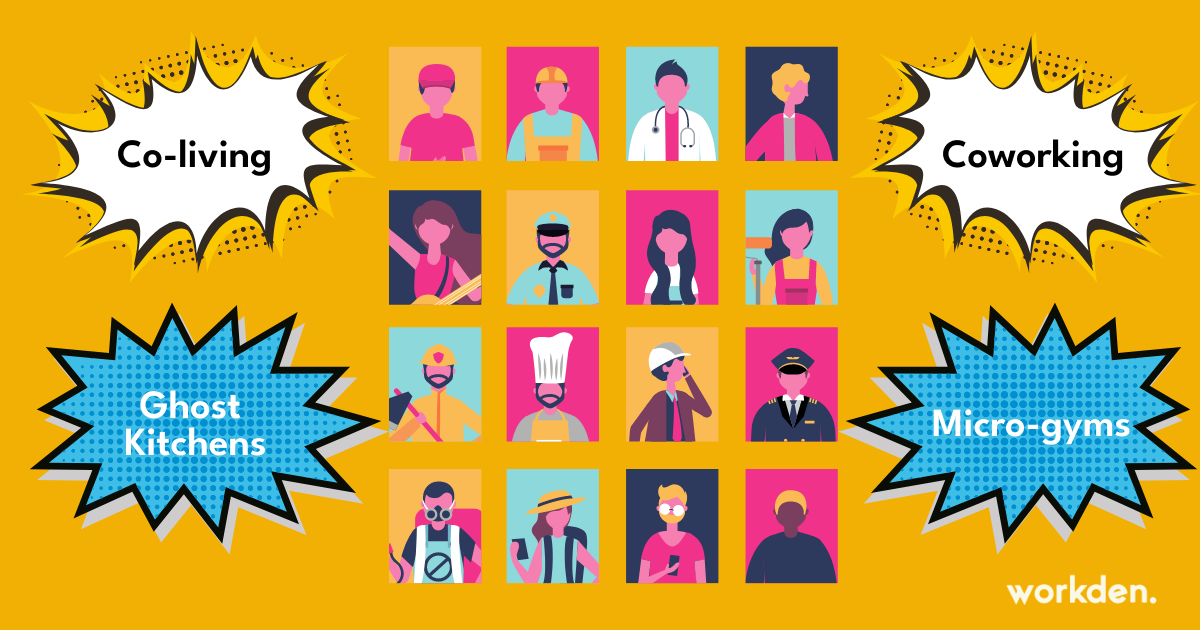Revolutionizing the Way We Work: The Game-Changing Impact of Space-as-a-Service
In recent years, the concept of "space as a service" has revolutionized the way businesses operate and individuals consume products and services. Rather than committing to long-term leases and fixed infrastructure, like traditional commercial or residential spaces, the space-as-a-service model offers flexible and dynamic environments that can be rented on a temporary basis, with a range of services and amenities to meet the changing needs of modern businesses and individuals. This model has opened up a range of opportunities across various industries, including coworking, co-living, food delivery and more. In this article, we'll explore the implications of this model, the industries it's impacting, and how it's transforming the way we work, live, and play.A key driver to the upsurge of ‘space-as-a-business’ model
The rise of entrepreneurship era
With the digitization movement and the rising number of entrepreneurs worldwide (more than 580 million entrepreneurs worldwide today), starting a business has never been easier. However, with this surge in entrepreneurship comes a need for flexible and affordable office space, as well as access to shared resources and services. This is where the 'space-as-a-service' model comes into play. It offers entrepreneurs the opportunity to test their ideas and launch their businesses without the upfront costs and risks associated with traditional commercial leases. Furthermore, it allows them to connect with other like-minded individuals and access a range of support services, such as marketing and mentoring, that can help them grow and succeed in their ventures.Industries riding on the ‘space-as-a-service’ business model
The concept of space as a service has opened up a world of opportunities for various industries. Here are some of the ways these industries are utilizing space as a service.Co-living
Co-living is a relatively new concept that has been gaining popularity in recent years. It involves sharing a living space with other people, usually strangers, in order to reduce living costs and foster a sense of community. Companies like Coliving and Bungalow offer fully furnished and serviced apartments/houses with shared communal areas, such as kitchens, lounges, and laundry facilities. This makes it easy for individuals like digital nomads, remote workers to move into a new city or country and quickly find a comfortable and affordable living situation.Co-working
Co-working is another industry that has greatly benefited from the ‘space as a service’ concept. Workden have turned traditional retail spaces like local restaurants into dynamic and collaborative work environments that can be rented out on a flexible basis. This is especially beneficial for freelancers, startups, and small businesses who cannot afford to commit to long-term leases.Ghost kitchen
Zippia reports that online food ordering has grown 300% faster than dine-in since 2014 and now accounts for approximately 40% of total restaurant sales. This trend has opened up opportunities for food entrepreneurs and restaurants to enter the delivery-only market using ghost kitchens, also known as virtual or cloud kitchens. Ghost kitchens are shared professional kitchen facilities designed exclusively for food preparation and delivery, and are rented out on a term lease basis. With ghost kitchens as a service, food entrepreneurs can experiment with new concepts and meet the rising demand for online delivery services.Micro-gyms
Another industry that has recently embraced the space as a service concept is the fitness industry. Personal trainers who cannot afford to rent a full gym space are now renting out fitness facilities on a flexible basis to train their clients. This not only provides a cost-effective solution for trainers, but it also offers a more personalized and private workout environment for clients who prefer to avoid crowded gyms. Deep-dive into Coworking-space-as-a-service
Coworking spaces have traditionally been associated with purpose-built offices or dedicated coworking spaces. However, in recent years, the trend of coworking in cafes and restaurants has emerged, providing a more casual and flexible workspace for remote workers, freelancers, and entrepreneurs. Here are some of the implications of coworking in cafes and restaurants for both the business owner and the coworking community:For the Café or Restaurant Owner:
Additional Revenue & diversification
By offering coworking spaces, cafes and restaurants can generate additional revenue from renting out space that would otherwise be unused during off-peak hours. In addition, offering coworking spaces can diversify the business, attracting a new customer base and increasing the overall appeal of the café or restaurant.2. Increased Foot Traffic
Coworking spaces can attract a regular stream of customers, who may return to the café or restaurant for meals or drinks, providing additional business opportunities.3. Improved Brand Image:
Offering coworking spaces can enhance the brand image, positioning the business as a modern and innovative establishment.For the Coworking Community:
Flexibility
Coworking in cafes and restaurants provides a flexible workspace, allowing remote workers, freelancers, and entrepreneurs to work in a more casual and relaxed environment, while still maintaining productivity.2. Cost-Effective
Coworking in cafes and restaurants can be more cost-effective than renting a dedicated coworking space, as there are no monthly fees or long-term commitments.3. Variety
Coworking in cafes and restaurants provides variety and a change of scenery, allowing remote workers and freelancers to work in different environments, potentially boosting creativity and productivity.In conclusion, space as a service offers a range of benefits and opportunities for both enterprises and employees. From flexibility and cost-effectiveness to collaboration and professional development, space as a service is transforming the way we work and do business.


